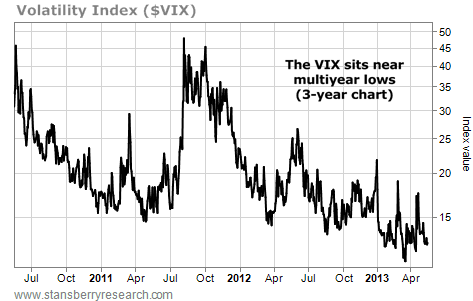| Home | About Us | Resources | Archive | Free Reports | Market Window |
Why I'm NOT Betting on Higher Interest RatesBy
Tuesday, May 14, 2013
Bill Gross is the world's greatest bond investor. But I'm not betting on his latest market call... And you shouldn't either.
Gross is to the bond market what Warren Buffett is to the stock market...
Just like Buffett, Gross has managed to trounce his peers for decades even as his assets under management have grown to an incredible size. Gross' firm PIMCO now manages over $2 trillion in assets, making it the world's largest bond investor.
If you had invested $10,000 in Gross' bond fund at inception in 1987, you would have nearly $80,000 today. Remember, these incredible gains were in "boring" bonds – not in stocks.
But Gross says the fun in bonds is now over... On Friday, he wrote on Twitter that the "30-yr bull market in bonds likely ended 4/29/2013."
When the Bond King speaks, I listen... It's hard to argue with his track record.
But in this case, I will argue...
Personally, I'm not betting against bonds... at least not yet. Here's why...
We're in a unique moment in history – we're seeing a "mini bubble" in central bank powers.
In short, investors believe central bankers – like Ben Bernanke from the U.S. Federal Reserve – have incredible powers to manipulate markets... Investors believe that central bankers can make bond prices go up or down at will.
As long as investors continue to believe that, it becomes true – a self-fulfilling prophecy.
The thing is, it's not true... Investors as a whole can move dramatically more money than any government or central bank can. And someday, they will realize that. They'll shift their thinking. And that is when interest rates will finally soar.
But I think that day could be a long way away...
Central banks can fool people for a very long time, keeping interest rates very low for a very long time... and causing crazy booms in stocks and real estate.
Japan is an interesting example of what I mean...
In Japan, interest rates on government bonds are below 1%. And stock prices are soaring. Yet relative to the size of its economy, Japan has much more government debt than the U.S. does.
The Japanese government and Japan's central bank have successfully fooled the people of Japan. The bond market has not crashed. And the stock market has soared.
Bill Gross may be right. The 30-year bull market in bonds may have ended on April 29. He should know – he knows bonds better than anyone on the planet. But I'm not putting any chips on the idea of a bond-market bust.
Just to be clear, I'm not betting in favor of bonds either...
Instead, my chips are on the idea that central banks will be able to fool investors for years and keep interest rates low.
In that situation, the right trade is to be in stocks and real estate.
Good investing,
Steve
Further Reading:
"When even the Bond King says you don't want bonds, you know it's time to lighten your load in bonds," Steve writes. Real assets are a better bet. And Steve's favorite real asset now is real estate. "It's what I'm doing with my own money… you should consider doing the same," he writes. Get the details on why you should replace your bonds with real assets here.
"EVERYONE believes interest rates HAVE to go up," Steve writes. But "history says rates could stay this low for a long time. And possibly fall even lower in the next few years." Long-term interest rates in Japan fell below 1% in the 1990s. And today's U.S. interest rates have been following Japan's lead. Find out how low U.S. interest rates could fall here.
Market NotesA MARK OF INVESTOR COMPLACENCY One of the surest bets in all of finance is ready to pay off again...
Regular DailyWealth readers know there are few sure bets in the financial markets. There are few "this is the case, and it always will be" statements we're comfortable making. The market is too random... and too dynamic for those types of claims.
But one "this is the case, and always will be" statement we'll stick by is this: "Calm periods of rosy headlines and softly rising prices will always be interrupted by periods of wrenching volatility... and vice versa." That's just the way the world works.
For a picture of this "always the case, always will be" phenomenon, we consult the popular Volatility Index (the "VIX"). It's the most popular gauge of market volatility. When the VIX is low (around 15), it indicates investors have few worries and see blue skies ahead. When the VIX is high (above 30), it indicates panic and confusion.
As you can see, low VIX readings are regularly followed by big spikes in volatility. And right now, we're seeing VIX readings below 13. In today's world of Flash Crashes and debt scares, these are "basement" level readings. Expect a spike soon...
 |
In The Daily Crux
Recent Articles
|


